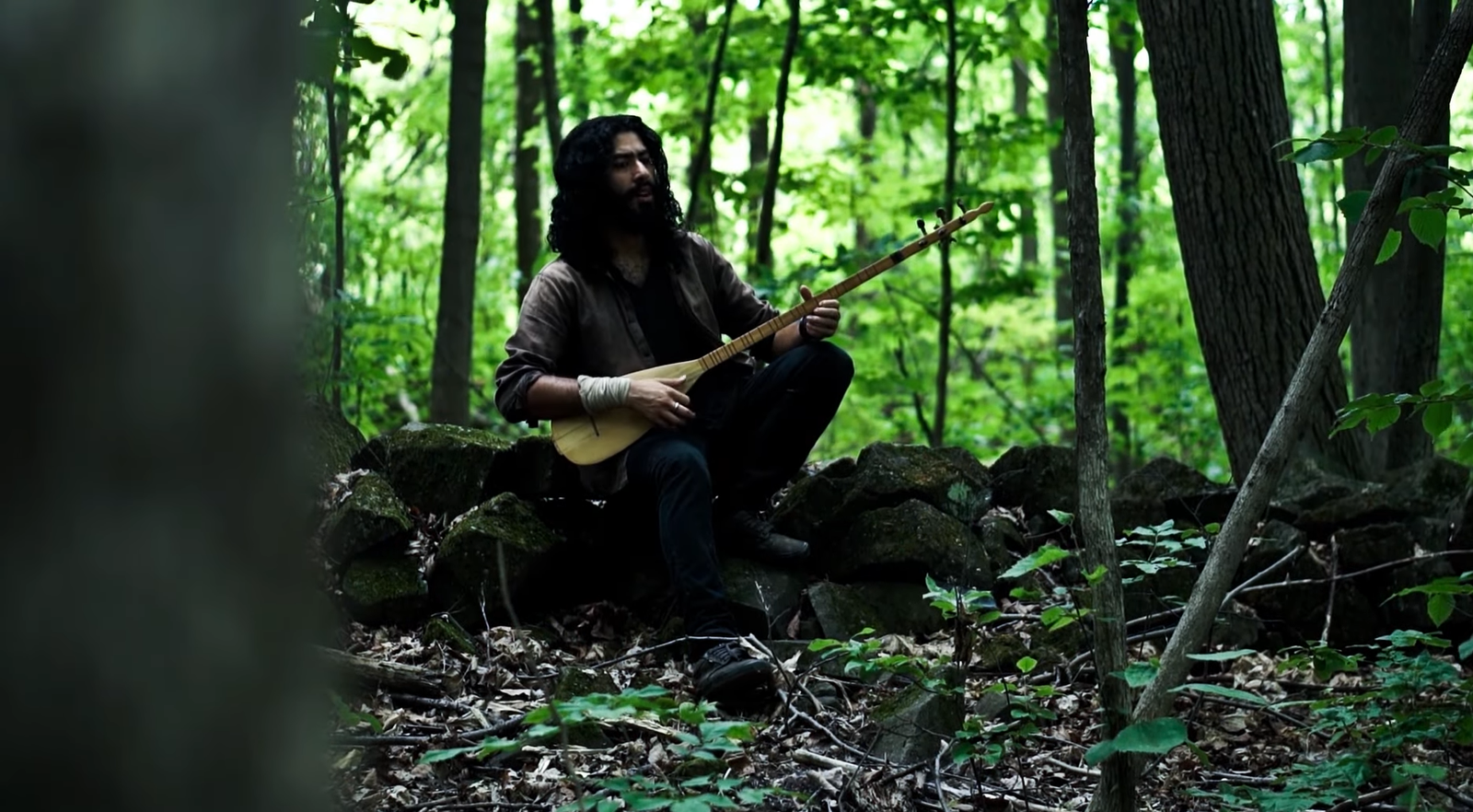One evening not too long ago one of my best friends sent me a link to some song, mentioning I should absolutely check it out. It was a random find on YouTube. While I just can’t recall exactly which one it was, I went down a rabbit hole through Farya Faraji’s works. Surely enough, I was enthralled in no time and I was drifting and swerving through arcane visions of the past, coursing through the billowing smoke of history. It was like magic — and it still is. It was one of the few times I was so taken with early music/pre-medieval music. Never have I experienced such an authentic atmosphere with such a profoundly immersive character. Then, I felt an itch. It only took minutes until I figured out what that was so I reached out to Farya Faraji, in order to discuss his works and his vision.
I didn’t know what to expect quite frankly, but in the back of my head some kind of expectation did form. Since, by the end of our conversation, these expectations felt circumvented, albeit exceeded at the same time. I was fascinated by this journey, both in terms of music and in terms of discourse.
Digging through Faraji’s repertoire on Bandcamp and YouTube, as they aren’t all in the same place (more on that shortly), I was surprised by the world class production value as well as the wide variety of instruments present. This, obviously begged the question of whether there’s a band behind it all, studio magic, or a singular massive entity? The answer isn’t particularly glamorous, but it comes with an ebullient and straightforward kind of honesty:
‘I play, to varying levels of proficiency, about a dozen instruments like the bağlama, kopuz, Kurdish tanbur, cura, etc. This ‘dozen’ shouldn’t come across as impressive: I’m not an extremely skilled player at any of them, and if anyone decides to look them up, they’ll see that they’re all lute instruments: the family that guitars belong to. They’re all very similar so it’s easy to transfer the skills learned with one of them over to the others. I also play the santour, and ancient Greek, Mesopotamian and Germanic lyres. As they say: ‘jack of all trades, master of none’. I’m at best mediocre at all those instruments, and I wouldn’t be able to perform live satisfactorily — I only have enough proficiency with them that I can record what I need, aided by the comfort of multiple takes and editing.’
This obviously further raises the question of musical education. Is there a wealth of conservatories trodden behind it? Or rather the now almost common DIY attitude of working it out as you go? It’s somewhere in between, but not quite at the same time:
‘None whatsoever, and certainly not Western musical education given my Iranian background. I grew up in a musical family, and I would say that most of what I learned, I learned from listening to my grandfather play and teach music when I was child. I don’t really regard myself as a musician, but more like a lover of ethnomusicology that performs said field of study. It makes perfect sense given the kind of music that I make: all of it is based fundamentally on ethnomusicological study and folk-tradition. Formal education isn’t something that works with these forms of music — they work the way that music was taught over most of human history: listen and play. That said, given my interest in ethnomusicology, I do have some grasp of theory, mostly in Eastern and Ancient Greek music though — my understanding of Western theory is nonexistent, and I don’t think I’ve ever used a chord progression in any of my original music.’
Tying into all of this, I have to ask about the origin point of this endeavor, particularly the one of creating music. It’s quite straightforward:
‘I’ve always been an avid listener of music throughout all my life, given my musical family, but I only started picking up music in 2016. I installed a piano-app on my phone and played my very first notes then. For the next three years I’d keep just playing on the app a little bit, until in 2019, I began seriously writing my own stuff. So it depends on how we want to define the beginning of my musical journey: I’ve been actually making music for three years, I was playing on that app for three more before, but I’d say the actual journey began back in 1996, when as a baby, I was already hearing my grandfather play the haunting sound of the Iranian santour.’
In many parts of Faraji’s repertoire, the music seems to stay true to the period it hearkens back to in terms of architecture and instruments, in others it seems that it goes for a full-blown orchestral type of expansion that’s reminiscent to modern film score. Is there a clear aim towards one, the other, or rather a blend of both? This time around though, the explanation is exhaustive and thorough, because things aren’t always as simple as they may appear.
‘The thing is that my music albums available on Bandcamp right now are only extensions of my YouTube channel: and only by looking at the latter does the picture become clear. I set out to form my channel with one goal in mind: to make ethnomusicology accessible to more people, and disseminate knowledge about world music. World music is one of the subjects that we’re the most ignorant about, societally speaking. I’ll use an example: bagpipes. It’s impossible to use a bagpipe in Greek music without someone exclaiming that it makes no sense, because as far as most people are concerned, bagpipes are a Scottish thing. Most of us aren’t aware that bagpipes are one of the most universal instruments in the west of Eurasia, that Greeks have many types of bagpipes, that they’ve had them for longer than the Scots ever did, that even Iranians, Bulgarians, Italians or Turks have them. The stereotypical conflating of bagpipes with Scotland is so pervasive in pop-culture that media in turn, has to cater to audience expectations in order not to shock them.
He continues:
‘The consequence? Bagpipes are only ever heard in pop-culture when Scotland is around, and if you’re watching a movie or a documentary about Greece, their bagpipes must be censored, because it’ll confuse people, and the soundtracks will only use the instruments and sounds that conform to audience expectations of Greece. The ultimate outcome of this is a warped understanding of world music at large, and it creates a vicious circle. I was employed on three different occasions to compose Greek-themed music for three different indie video games. When I used Greek bagpipes, I was asked why I was using a Celtic sound in a Greek soundtrack. When I explained to them that bagpipes are very much part of Greek tradition, I was told, ‘yeah but people will be confused, so don’t use bagpipes.’
‘This vicious circle is extremely damaging to world music. Audiences have a warped idea of foreign ethnic traditions, and media must conform to that warped idea in order not to shock audiences, which in turn, only reinforces the misconceptions. And most of our understanding of world music tends to come from soundtracks. Very few people listen to world music, but almost everyone watches Hollywood films with pseudo-ethnic-historical music.
‘This is where we get to your question. There is a specific niche of historically themed music (themed is the operative word here) especially on YouTube, that is extremely popular. Songs named “Epic Medieval Music,” or “Epic so and so” get many views, and I quickly understood that many millions of people get their idea of historical and world music from those. There are some videos of supposedly epic ‘Persian’ music with millions of views on YouTube, that, whilst great music, are clearly written by Westerners without any actual understanding of what actual Persian music is like. I cannot speak for their quality as pieces of music as that is subjective, but as representations of a culture’s music, they are utter caricatures — vaguely oriental sounding pieces that sound like what Westerners believe Middle-Eastern music sounds like. It’s music influenced by and catering to that very vicious circle of warped expectations. I equate them to an American doing a stereotypical Italian accent while gesticulating, and people believing that to be an accurate representation of an Italian accent.
Finishing up with how Faraji intends to combat misconception:
‘So, my goal is to intrude in that niche a little. When looking at my YouTube page, which has my entire library, it will be clear that by far, most of my music is heavily lopsided towards authenticity and realism. However, these are also the ones that typically get the less attention. The full-blown orchestral ones are what I consider to be the ‘gateway drug’. If you throw actual ancient Roman or Greek music at someone from the get-go, most of them will run away because of how alien it sounds. What I’ve found is that, if you start by luring them in with a compromise, they’ll gradually get used to the strangeness of authentic sounds, and will come to accept them in time. I use the full-blown orchestral ones as gateway drugs: their sound is very accessible, soundtrack-like and comfortable, but they have some historicity, some grit and authenticity peppered in, ever-so slightly. That way, people are introduced gradually to the authentic sounds, and are given time to process them.
‘Ancient Roman music is a good example: they used bagpipe-sounding instruments and melodies that we associate in the West with Arabic culture. People reject that viscerally if offered to them straight, but if you introduce these elements to them as I do with a layer of orchestral, soundtrack-like comfort zone, they’ll digest it better. Very few people are interested in actual historical music, but there are millions of young people out there in love with Ancient Rome. They will flock to bombastic, epic orchestral music about this subject they love. My craft is to sneakily introduce them to authentic sounds without them having necessarily looked for it in the first place. And so, while they’re enjoying the accessible soundtrack-like quality, they’re also hearing all the historical pronunciation, instruments and musical modes that I’ve snuck in, and subconsciously, their expectation of Ancient Roman music is changing and lining up more closely with what Ancient Roman music actually was.’
For now, at least, it appears that Faraji’s output is focused intently with sounds that existed a very long time ago. Here I wondered, what was the drive behind exploring this particular timeframe of music, as well as history. As an addendum, it would be interesting to see what is the goal of these explorations as well.
‘I said earlier that I don’t really consider myself a musician, and more like a performative amateur-ethnomusicologist. Ethnomusicology is also just a side interest for me. My academic background is in history, and that’s where my main interest lies. So, when it comes to my historical and historically-themed music, what you see is nothing more than a history lover with some musical knowledge. When it comes to the living traditions that I explore, I am myself a product of a folk music tradition, that of Northern Iran. My native form of music is a little folk tradition, and therefore I feel connected to all orally transmitted folk traditions of the world. As for what I seek to achieve in these explorations, it harkens back again to the previous answer: to readjust people’s image of world music. Currently, our expectation of world music is antithetical to the reality of world music, and we often reject ethnic traditions on the basis that they don’t match our expectations. (People rejecting bagpipes in ancient Roman music because ‘they don’t sound Roman,‘ even though Romans had them.) I want people to become acquainted with actual Iranian music, actual Ancient Greek music, actual Medieval music, etc., and for people to understand that the ideas of these traditions they have, transmitted to them through Hollywood and game soundtracks, is quite some distance from the actual reality of said traditions.’
Now this interest is also particularly focused on the ancient Middle East, with detours around the ancient Turkish peninsula (Byzantium), and ancient Greece as well. The details that expand on this point, tie in neatly with the answer above.
‘It has to do with familiarity. If you speak Spanish, it’ll be easy for you to pick up French or Italian, because all three are Romance languages, and are largely similar in terms of grammar and vocabulary. Musical styles work the same way: my origin is in Iranian music, and Iranian music is fundamentally the same as Greek, Turkish, and to a large degree, even Ancient Greek, which is the main ancestor of most Eastern traditions. Generally, the music I make, whether it be arrangements of existing pieces, or original pieces, strives for authenticity and realism. I know what it’s like when Western composers lazily write caricatures of ethnic music — someone from the background in question can hear the lack of research in the music itself. The last thing I want to do is misrepresent a culture, past or present. ‘Eastern’ music of the area of the Middle East and the Eastern Mediterranean is the one I’m naturally attuned to, and therefore I can be confident in my abilities to represent it faithfully.’
The music Faraji makes is generally highly evocative, reliant on textures and moods, more than on structure (not beyond offering the epoch appropriate structure anyway). Where is inspiration drawn from in order to achieve this style of composing and voicing? I really do also mean highly evocative; it has a charm which transports me into places and times which I’ve never experienced with a surprising authenticity, I would assume others who listened have had similar comments – what is this is owed to? The answer is yet again, far from glamorous, and it involves a huge amount of work, yet fascinating nevertheless:
‘Research, research and research. I look into the sounds of cultures and binge-read pages upon pages of academic papers and books describing their theory in detail. I can’t stress enough how little originality and creativity there is in my music, in fact these two are the antithesis of the musical philosophy I employ. Many people often find this strange, as they ask how a musician can put aside creativity. This again harkens back to the idea of performative musicology vs purely artistic musicianship. My goal is to familiarise people with authentic renditions of world music. In order to do that, I must put myself aside. It can’t be about me, my vision, and what I what to convey. It can be hard sometimes, but in such a pursuit, I must accept that I can only be a conduit. I have to put myself aside and let the tradition come through. To this, people often say: ‘but we can’t just be stuck in tradition, things must evolve at some point.’ This is true, but I always ask them: ‘have you ever heard actual Ancient Greek sounds? Actual Iranian sounds? Actual Viking sounds?’ All most people have ever heard is the creative music about these themes. Most people’s musical idea of Ancient Greece is the western orchestras of Hollywood scores, or the rock-influenced neo-pagan folk sounds that have come to represent Viking music in pop-culture. I want to stress that I’m not opposed to these: I listen to them and enjoy them. They have a place in our culture, but they shouldn’t completely supersede the actual musical traditions of these distant times and places, or worse, be mistaken for them by most people.
‘The evocative charm that you mention, that most people who listen to this music also feel, is a testament to the incredible potential of just letting these traditions come through. I absolutely adore Hans Zimmer’s creative score for Gladiator, where he used Eastern sounds mixed with orchestras to evoke Ancient Rome: that creativity paid off and it’s one of my favourite soundtracks of all time. But there has never been an Ancient Rome movie that has used the music of Ancient Rome in its soundtrack, mostly because I think composers and musicians want to have fun, they want their creativity to shine through, they want their vision to be heard. I think it takes a lot of maturity to put aside our hubris, and accept that sometimes, just learning the tradition faithfully and letting it express itself will do more than our creativity ever could. So, my answer would be that I don’t even draw inspiration, as that implies that I’m only using inspiration as a springboard. All I do is listen and imitate, and whatever creativity I utilise remains in the confines of the tradition I’m delving into. All the credit goes to the original traditions. I only did my homework.’
Faraji’s Bandcamp description states that he is ‘a lover of all cultures and musical traditions’. Now, I don’t mean to nitpick or anything of the sort, hahaha, but it does not look like it right now. Is there a plan on making music that hearkens back to other cultures from Asia, Africa, Europe, and the Americas in a similar fashion to what is being produced currently? Or is this rather more of a mindset type of thing in the present approach to the arts?
‘My YouTube channel will again offer a much broader picture, as half of my musical library is made up of arrangements of traditional folk songs, many from Europe and America, as I am not only Iranian by origin, but also French Canadian by upbringing, and one of my goals is to expose our Québec traditional music, as well as other North American folk traditions. Eventually, do I want to branch out into other cultures and continents? Of course, but it will take years of steady learning and practice before I’m confident that I can represent these traditions authentically. The kind of caricatural music that I mentioned earlier, where foreigners think they’ve written Persian, or Indian, or Native American music, is a product of musicians simply imitating the surface level stereotypical sounds and thinking it’s good enough. This complacency is extremely damaging culturally, as once again, it helps produce this warped idea of ethnic traditions in pop-culture. I would love to jump in and start writing Chinese music right now, but my respect for the tradition demands that for now, I sit down, shut up and listen.’
I understand and admire this goal to educate people in regards to what are these widely propagated historical fallacies; however, I’d like to know what is the root desire that drove this entire endeavor into being materialized. I would assume it’s something that began to bloom while studying history and since it seems that the educational videos made alongside the music are taking something of a turn in this direction.
‘Studying history is what really ‘activated’ my desire to undo historical fallacies indeed. The more you learn, the more you realise how little you and everyone around you really knows. I’m not against ignorance, personally. People being generally ignorant of history at large isn’t a problem, because it means they just don’t know about a subject. That’s a passive, harmless thing. The problem is when people think they know something, but it’s a misconception. That isn’t passive, it’s an active action of propagating misconception by actively believing in it. When it comes to wanting to correct misconceptions about living cultures, it’s a product of my Iranian background, and having to deal with stereotypes and misconceptions about my culture. I’m obviously more passionate about the latter: Vikings don’t exist anymore so it’s not an ethical issue if people believe stereotypes about them, but it does become ethical once we deal with living people.’
Among many things, Faraji mentions in one of his videos that his tastes are ‘basic’. It is also mentioned in that same breath that he likely wouldn’t create, by his own inspiration/volition, something much different than what he normally listens to. That’s something that I’d like to hear more of and extending this query – does he plan on making original compositions which aren’t related to the world music/ethnomusicologist angles and/or unrelated to things that are consumed on a personal musical level? If so, where would that fall?
‘Yeah at the end of the day, I still vibe to the most mainstream pop stuff out there, these days I’m really into Ariana Grande and Olivia Rodrigo. I think me not making the kind of music I listen to has to do with a difference in interest: I’m interested in listening to pop music, but I’m interested in making historical and folk music. Modern pop isn’t exactly a mystery that requires research and digging into old books—and it’s this process that I enjoy when it comes to historical and world music. As to if I’ll one day make something else, sure. In the future, I actually see myself making pop music that subtly integrates Eastern musical elements. People underestimate the degree to which traditional folk sounds can become mainstream: the melody of the “Pump It” Black Eyed Peas song is a traditional Greek melody played on Hijazkar, an Eastern musical mode. That would be a long-term dream of mine in the future: to help subtly integrate Eastern musical aesthetics into mainstream pop without people even knowing, the main thing being microtonality. Middle-Eastern music has more notes than Western music does, and that to me represents an untapped potential. We could literally use more notes, here in the West. Modern American pop after all is often an African influenced form of music. When you’re listening to Ariana Grande or Taylor Swift, you’re hearing the recycling of traditional African and European elements. I personally don’t see mainstream pop as this boring thing: it’s an ever-evolving genre of music and it can be greatly enriched with the addition of music from all around the world.’
My final curiosity (at least for the moment) stands with if there any particular reason for which Faraji has segregated his Bandcamp content from the one on YouTube (released music)? There seems to be basically no overlap between the two in terms of content.
‘I just sell on Bandcamp the music for which there’s the most demand, which happens to be the louder, ‘epicer’ half-soundtracky songs. They’re designed to be gateway drugs for the more authentic stuff, and therefore they’re bound to the popular ones that people ask me to put on other listening services. I know people would buy those so I put them where they can be bought, as I’m pretty sure almost no one would buy my French Canadian covers. My Bandcamp page is just a financial practicality to be honest.’
Farya Faraji engages in what is a truly noble endeavor powered by an innate curiosity for the past circumstances that shaped the world. While I expected to delve into music strictly, as I tend to do when chatting up with musicians and artists, I ended up feeling thoroughly enlightened by all the things I learned which are new to me. I was also caught off guard, since musicians usually tend to have the singular scope of creating sound arrangements one way or another, with not much in regards to the other areas permeated by music.
Since this conversation began, I ended up binging the educational videos made by Faraji up to now, and I really enjoyed them a lot, as much as the music he revives. I obviously cannot recommend either enough and if you made it this far, you’ll be glad to know you can follow him on YouTube, Bandcamp, and Instagram.







One Comment